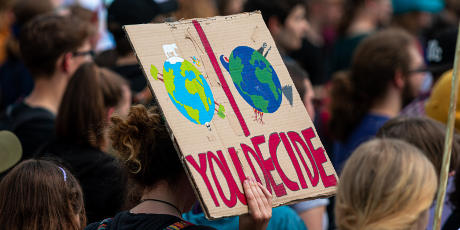How to sell positive messages to deal with climate change 10 Aug 2020

'Favouring the term 'climate action' allows for positive messaging along the lines of the narratives around Covid-19 in that measures are being actively taken and we are all doing our part in the fight.'
The communications and narratives around climate change have to become embedded across the country in the same way as Covid-19
By Evan Boyle and Ben O'Regan. Evan Boyle is a PhD Researcher and Ben O'Regan is an Intern in the Energy Policy & Modelling Group, of MaREI and the ERI
In the first weeks of the Covid-19 pandemic, President Michael D Higgins told the nation that "we are now living through what is the globalisation of a common, shared vulnerability". Living with the global public health pandemic has become embedded in our lives and brought forward in our minds through common messaging and narratives, helped in part by the establishment of NPHET’s Behavioural Change Subgroup.
Last year, a small tannoy was installed on the entrance to the Doneraile Walk in Tramore to remind walkers to pick up after their dogs. In lockdown, it was used to instead to remind walkers of the need to keep their social distance. Local shops remind customers of the need to wash hands and buses remind us of the need to wear masks. Even a local pirate radio station sent public health messages from the WHO across the airwaves.
The messaging on Covid-19 has been led by the WHO, filtered through national governments and taken up at regional and local level across public, private and community sectors. With a global health pandemic of this nature, the science is always evolving and the messaging has aligned with this. No absolutes were given where they are not possible, just the best possible advice in light of the best information available.
Climate change is more abstract shared vulnerability that may benefit from a similar approach to messaging and narratives. The IPCC is a body of similar authority to the WHO and their 2018 Special Report on Global Warming of 1.5°C highlighted the need for "rapid and far-reaching" transitions in land, energy, industry, buildings, transport, and cities. A fall of 45% of global net human-caused emissions of 2010 carbon dioxide (CO2) levels by 2030 is required to limit warming to 1.5◦C. Again, the science is always evolving, but the more we know with climate change, the greater the need for urgent action.
The human and natural ecosystem impact of climate change is understood by people across the world and there is consensus within the scientific community. But unlike Covid-19, the messages and narratives around this shared vulnerability have not become embedded across the public, private and community sectors. The communication has not yet crossed party lines and market dynamics.
We need to frame climate change to highlight the economic benefits of 'green jobs’ as an effective strategy for climate action. According to the World Economic Forum, 15 systemic transitions with annual business opportunities worth $10 trillion could create 395 million jobs by 2030. These systemic transitions will be most visible in the areas of food, land and ocean use, infrastructure and the built environment, and energy and extractives. Favouring a green future means creating jobs, driving capital formation, and increasing economic resiliency.
In an address to the nation in mid-March, then Taoiseach Leo Varadkar stated that we must "come together as a nation by staying apart", an echo of the shared vulnerability that Michael D Higgins later spoke about. While climate change is a complex issue, this approach to narrative and messaging can be applied to how we frame our thinking around a topic, specifically with regard to the use of positive messaging over the negative, solutions and solidarity over fear and polarisation.
On the one hand, the phrase ‘climate change’ sounds neutral when scientists are talking about catastrophe for humanity. On the other, the term ‘breakdown’ comes with connotations of possible failure or collapse- a narrative which has become more common in recent years. Favouring the term ‘climate action’, however, allows for positive messaging along the lines of the narratives around Covid-19 in that measures are being actively taken and we are all doing our part in the fight.
The global agreement of the Paris accord set a step in the right direction, and the 2019 Climate Action Plan outlined a clear path. While ambition may be lacking in places, the new government has a blueprint for climate action in the coming decade. This policy roadmap, however, must not be travelled alone. The need for the whole country to travel together, facing this shared vulnerability just as we are facing Covid-19, is essential.
The solutions to overcoming the shared vulnerability of climate change must become embedded in the everyday of Irish life across all sectors of society.
As we move forward, lessons gathered from the narratives and messages around the pandemic must be applied to climate action. There are no simple answers, but commonality of narrative and messaging can support solidarity. Widespread societal changes are needed, from traveling less and changing our energy use, to eating in a less emission intensive manner and altering our consumer habits towards sustainable practices. Just as social distancing, face masks and the contact tracing app have been taken up by the citizens of Ireland, the solutions to overcoming the shared vulnerability of climate change must become embedded in the everyday of Irish life across all sectors of society.